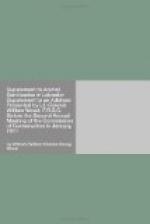cases.... About three years ago, ruffed
grouse were so scarce everywhere that I have
travelled hundreds of miles without seeing one.
They were protected by law, which no doubt did much
near the densely populated sections, but as far as
our coast was concerned did absolutely nothing
because Indians and trappers shot them on sight
for food. Last year there were a few seen
here and there and all at once, during the present
season, there are thousands. Hundreds have been
shot and they are reported abundant all over.
I imagine this must be due to particularly favourable
weather conditions and the immense number of
foxes trapped last winter. There is also this
fall, an extraordinary number of muskrats—they
are swarming everywhere, even in totally, unfavourable
localities, doing much damage in some places.
What is the cause of this? Presumably it
must be through some cause decreasing the number
of their enemies. This is why I think much
care must be taken before any steps are taken to protect
certain species. Some still hold their own against
all odds.
His Royal Highness the Duke of Connaught, Governor General of Canada, acknowledged the receipt of the Address from Balmoral Castle in September, granted an interview at Ottawa in December, and authorized the use of his name to show his sympathy with the movement.
Dr. W.T. Grenfell has a long and most intimate knowledge of the Atlantic Labrador. He writes:
The matters of animal preservation which interest me most are: The rapid decline in numbers of harp seals which we Northern people can get for our boots and clothing. This food and clothing supply, formerly readily obtainable all along the Labrador, helped greatly to maintain in comfort our scattered population. It is scarcely now worth while putting out seal nets. We attribute this to the destruction of seals at the time of their whelping, by steamers which are ever growing larger and more numerous. No mammal, producing but one offspring can long survive this.
Along the Labrador coast east of the Canadian border, birds are destroyed on sight and nests robbed wherever found. The laws are a dead letter because there is no one to enforce them.
There is great need also for scientific inquiry with regard to the fisheries—the herring and mackerel are apparently gone, the salmon are getting scarcer, and the cod fisheries have been failing perceptibly these past years. Yet there is no practical effort made to discover the reason and obviate it.
On the 9th of September, 1911, Earl Grey made the following entry in the visitors’ book at La Roche:




